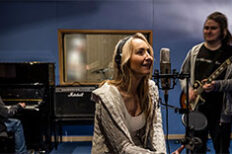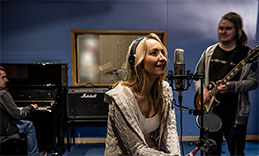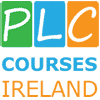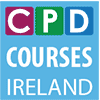Course description
Duration:
This is a Full time one year course, which runs from September to May. Exact details of the timetable will be given out to students during the induction process prior to class commencement in September.
Overview:
This course is for students who are interested in a career in music and sound engineering or music promotion. This course provides a combination of practical and theoretical tuition in all aspects of digital sound engineering and music production and is delivered by staff who are talented musicians. Students will record performers and musicians in an all iMac digital sound production facility, fully equipped with a comprehensive selection of state-of-the-art equipment. This course features a high level of training in a wide range of industry-standard music production software including: Pro Tools, Ableton Live and Adobe Audition. Students will also gain practical experience setting up sound facilities for live performances and location recording.
Entry Requirements:
One of the following:
- Leaving Certificate (LC Established, LCVP, LCA) or equivalent
- A Full Level 4 QQI Award (or equivalent)
- For Mature applicants (aged 21 or over) – appropriate experience will be considered in lieu of formal qualifications. Note: Mature applicants may be entitled to VTOS funding. For details about VTOS, please contact the college.
- Applicants whose first language is not English require level B2 competency on the CEFR language framework. Applicants may be required to undergo English language testing to establish their language competency.
Course Modules:
- Sound Engineering and Production
- Music Technology
- Ethnomusicology
- Event Production
- Radio Programme Production
- Desktop Multimedia Audio Production
- Work Experience
- Communications
Certification:
Level 5 Award Sound Production 5M2149
Special Features:
As well as learning about in-studio recording, students will get the opportunity to gain invaluable experience organising gigs, setting up sound facilities for live performances and doing on location recording.
This course is supported by FIT, which offers students the opportunity to acquire essential skills to gain employment. Students are given training in job interview techniques and CV preparation.
Specialist resources include:
Industry-Standard Sound Production Studio with Audient ASP8024HE Heritage Edition console, full set of instruments and assorted hardware effects.
iMac Digital Sound Studio. Our new iMac Lab replicates real-life industry experience
DJ Room with full Pioneer set-up including XDjs, vinyl turntables and club-standard mixers.
Digital Radio Studio with Adobe Audition
Internal live venue with stage and sound booth
Free Full Suit of Adobe Creative Cloud Software for all students on this course for one year to facilitate assessment work.
All DFEi students are provided with an M365 account, which gives them access to the tools and resources needed to deliver assessment work while attending their course. M365 Apps include Word, PowerPoint, Excel, outlook and OneDrive.
Work Experience:
Students will be required to undertake a period work placement in an organisation connected to their vocational area during the academic year. Work Experience is mandatory for all of our full-time Level 5 courses. Students are required to source their own work placement but will be assisted in this by the work experience teacher. The work placement is usually for a period of 10 days or a minimum of 60 hours. Students usually find the work experience element of the course to be invaluable and should bear in mind that a successful work placement can sometimes lead to further opportunities.
Additional Information:
Assessment:
Assessment techniques will be used to assess the knowledge and skills that students will have achieved on successful completion of modules:
- Student Record
- Portfolio/Collection of Work
- Assignments
- Examination – Written or Practical
- Project
- Skills Demonstration
A full major award is granted on passing the relevant eight components. On successful completion of each component, you will be awarded a pass, a merit or a distinction grade. See www.qqi.ie for more details
Progression Opportunities:
DFEi: Graduates may progress to the Level 6 QQI Advanced Certificate in Television and Digital Film or the Sound Engineering/Sound Production Level 6 at DFEi.
Elsewhere: Graduates are eligible to apply through the CAO and/or the Higher Education Links Scheme for entry to year one of a range of higher certificate and degree programmes, at Universities, Institutes of Technology and Technological Universities using their full QQI Level 5 major award. Places are not guaranteed in these Institutes and are subject to students meeting certain criteria. It is the students’ responsibility to consult with the relevant HEI for information on the admissions process and any specific entry requirements. Students may also refer to the individual HEI prospectus or may also refer to the QQI FET section of the CAO website. www.cao.ie
Examples of CAO progression opportunities are listed below.
Progression Examples:
BA Arts (DN520)
BA Humanities (DN530)
University College Dublin – www.ucd.ie
BA Commercial Modern Music (BIMM assessment/audition) (TU961
Bachelor of Music (audition) (TU963)
BA Media Production and Digital Arts (TU982)
BA Creative Digital Media (TU981)
Technological University Dublin – www.tud.ie
Higher Certificate Music and Instrument Technology (AL605)
BEng Music and Sound Engineering (AL718)
Athlone Institute of Technology – www.ait.ie
BSc Music Technology (LC270)
Limerick Institute of Technology – www.lit.ie
BA Creative Music Production (DL838) There is an option to do QQI Level 5 Mathematics module if a student does not have the LCE Mathematics requirement.
IADT, Dún Laoghaire – www.iadt.ie
BA Music (audition) (DK860)
BA Audio and Music Production (DK865)
Dundalk Institute of Technology – www.dkit.ie
BA in Music Technology (MH101). There is an option to do QQI Level 5 Mathematics module if a student does not have the LCE Mathematics requirement.
BA Arts (MH101)
BA Media Studies (MH109)
BA Psychology (MH106)
Maynooth University – www.nuimaynooth.ie
Career Paths:
Career prospects would include: Recording Engineer, Live Sound Engineer, Music Producer, DJ, Sound Designer, Artist Manager, A&R, Label Owner, Promotor, Music Publicist, Studio Manager, Radio Producer, Podcast Producer, Mastering Engineer, Singer/Songwriter, Session Musician.





 Distance Learning and Online Courses are offered in a number of different formats, these include correspondence courses (by post), online via computer or a combination of online and classroom instruction (blended learning).. View
Distance Learning and Online Courses are offered in a number of different formats, these include correspondence courses (by post), online via computer or a combination of online and classroom instruction (blended learning).. View  Further Education and PLCs (Post Leaving Cert Courses) have become a popular alternative to the CAO system here in Ireland. PLC Courses are validated by QQI (Quality & Qualifications Ireland) at levels 5 & 6 of the NFQ.. View
Further Education and PLCs (Post Leaving Cert Courses) have become a popular alternative to the CAO system here in Ireland. PLC Courses are validated by QQI (Quality & Qualifications Ireland) at levels 5 & 6 of the NFQ.. View  Continuous Professional Development (CPD) helps to keep job skills and professional knowledge up to date and ensures the standard of registrations & qualifications are maintained.. View
Continuous Professional Development (CPD) helps to keep job skills and professional knowledge up to date and ensures the standard of registrations & qualifications are maintained.. View  Evening courses and part time learning options are a great way to enhance a CV, to socialise and make friends, as well as learn something completely new. There are an abundance of night courses and evening classes available.. View
Evening courses and part time learning options are a great way to enhance a CV, to socialise and make friends, as well as learn something completely new. There are an abundance of night courses and evening classes available.. View